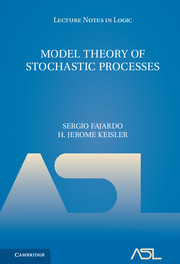Book contents
- Frontmatter
- Dedication
- Contents
- Introduction
- Chapter 1 Adapted distributions
- Chapter 2 Hyperfinite adapted spaces
- Chapter 3 Saturated spaces
- Chapter 4 Comparing stochastic processes
- Chapter 5 Definability in adapted spaces
- Chapter 6 Elementary extensions
- Chapter 7 Rich adapted spaces
- Chapter 8 Adapted neometric spaces
- Chapter 9 Enlarging saturated spaces
- References
- Index
Introduction
Published online by Cambridge University Press: 30 March 2017
- Frontmatter
- Dedication
- Contents
- Introduction
- Chapter 1 Adapted distributions
- Chapter 2 Hyperfinite adapted spaces
- Chapter 3 Saturated spaces
- Chapter 4 Comparing stochastic processes
- Chapter 5 Definability in adapted spaces
- Chapter 6 Elementary extensions
- Chapter 7 Rich adapted spaces
- Chapter 8 Adapted neometric spaces
- Chapter 9 Enlarging saturated spaces
- References
- Index
Summary
This book studies stochastic processes using ideas from model theory. Some key tools come from nonstandard analysis. It is written for readers from each of these three areas. We begin by intuitively describing this work from each of the three viewpoints.
From the viewpoint of probability theory, this is a general study of stochastic processes on adapted spaces based on the notion of adapted distribution. This notion is the analog for adapted spaces of the finite dimensional distribution, and was introduced by Hoover and Keisler [1984]. It gives us a way of comparing stochastic processes even if they are defined on different adapted spaces. Acentral theme will be the question
When are two stochastic processes alike?
There are several possible answers depending on the problem at hand, but our favorite answer is: Two stochastic processes are alike if they have the same adapted distribution. Early on in this book, we will consider questions of the following kind about an adapted space, with the above meaning of the word “alike”.
(1) Given a stochastic process x on some other adapted space, will there always be a process like x on?
(2) If a problem with processes on as parameters has a weak solution, will it have a solution on with respect to the original parameters?
(3) If two processes x, y on are alike, is there is an automorphism of which preserves measures and filtrations and sends x to y?
Questions (1) – (3) ask whether an adapted space is rich enough for some purpose. Adapted spaces with these properties are said to be universal, saturated, and homogeneous, respectively. Several arguments in probability theory can be simplified by working with a saturated adapted space, especially existence theorems which ordinarily require a change in the adapted space. In practice, probability theory allows great freedom in the choice of the adapted space. One does not care much which space is being used, as long as it is rich enough to contain the processes of interest.
Information
- Type
- Chapter
- Information
- Model Theory of Stochastic Processes , pp. ix - xiiPublisher: Cambridge University PressPrint publication year: 2002
